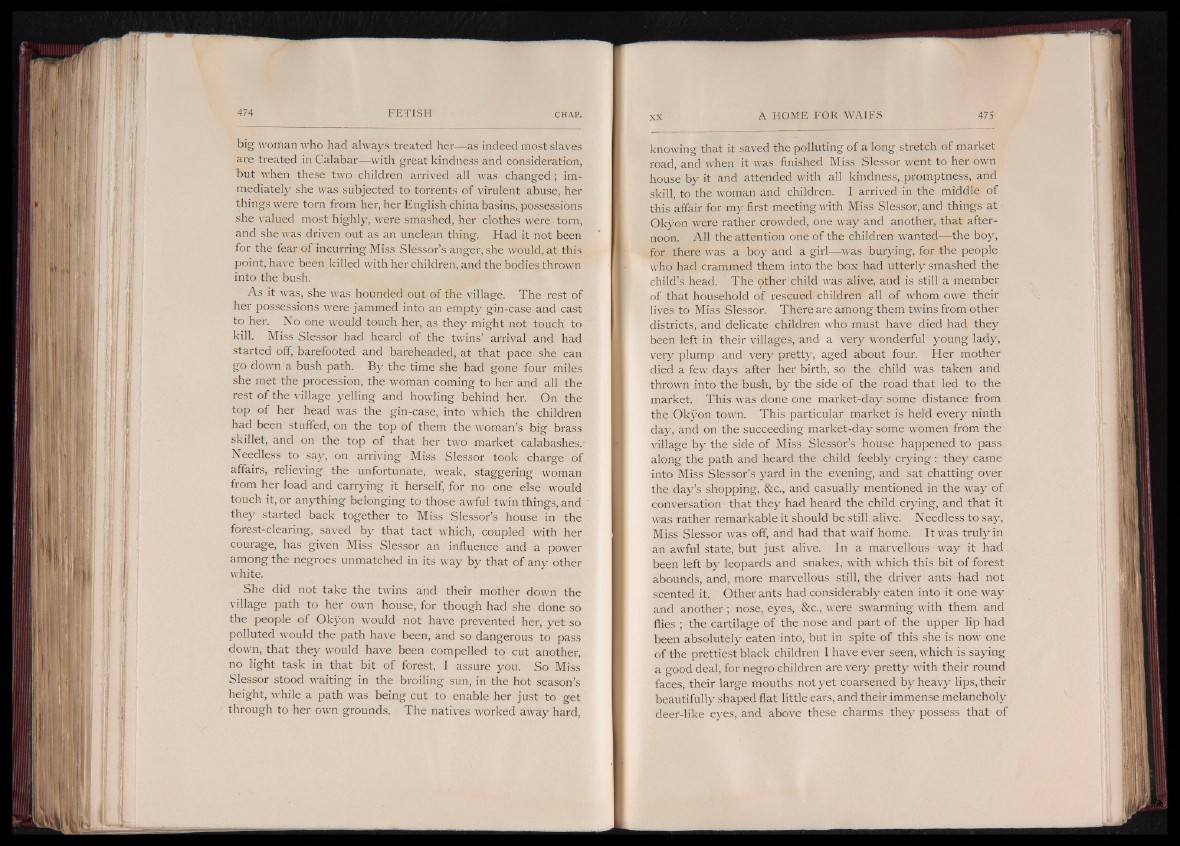
big woman who had always treated her— as indeed most slaves
are treated in Calabar— with great kindness and consideration,
but when these two children arrived all was changed; immediately
she was subjected to torrents of virulent abuse, her
things were torn from her, her English china basins, possessions
she valued most highly, were smashed, her clothes were torn,
and she was driven out as an unclean thing. Had it not been
for the fear of incurring Miss Slessor’s anger, she would, at this
point, have been killed with her children, and the bodies thrown
into the bush.
As it was, she was hounded out of the village. The rest of
her possessions were jammed into an empty gin-case and cast
to her. No one would touch her, as they might not touch to
kill. Miss Slessor had heard of the twins’ arrival and had
started off, barefooted and bareheaded, at that pace she can
go down a bush path. By the time she had gone four miles
she met the procession, the woman coming to her and all the
rest of the village yelling and howling behind her. On the
top of her head was the gin-case, into which the children
had been stuffed, on the top of them the woman’s big brass
skillet, and on the top of that her two market calabashes.'
Needless to say, on arriving Miss Slessor took charge of
affairs, relieving the unfortunate, weak, staggering woman
from her load and carrying it herself, for no one else would
touch it, or anything belonging to those awful twin things, and
they started back together to Miss Slessor’s house in the
forest-clearing, saved by that tact which, coupled with her
courage, has given Miss Slessor an influence and a power
among the negroes unmatched in its way by that of any other
white.
She did not take the twins and their mother down the
village path to her own house, for though had she done so
the people of Okyon would not have prevented her, yet so
polluted would the path have been, and so dangerous to pass
down, that they would have been compelled to cut another,
no light task in that bit of forest, I assure you. So Miss
Slessor stood waiting in the broiling sun, in the hot season’s
height, while a path was being cut to enable her just to get
through to her own grounds. The natives worked away hard,
knowing that it saved the polluting of a long stretch of market
road, and when it was finished Miss Slessor went to her own
house by it and attended with all kindness, promptness, and
skill, to the woman and children. I arrived in the middle of
this affair for my first meeting with Miss Slessor, and things at
Okyon were rather crowded, one way and another, that afternoon.
All the attention one of the children wanted— the boy,
for there was a boy and a girl— was burying, for the people
who had crammed them into the box had utterly smashed the
child’s head. The other child was alive, and is still a member
of that household of rescued children all of whom owe their
lives to Miss Slessor. There are among them twins from other
districts, and delicate children who must have died had they
been left in their villages, and a very wonderful young lady,
very plump and very pretty, aged about four. Her mother
died a few days after her birth, so the child was taken and
thrown into the bush, by the side of the road that led to the
market. This was done one market-day some distance from
the Okyon town. This particular market is held every ninth
day, and on the succeeding market-day some women from the
village by the side of Miss Slessor’s house happened to pass
along the path and heard the child feebly crying : they came
into Miss Slessor’s yard in the evening, and sat chatting over
the day’s shopping, &c., and casually mentioned in the way of
conversation that they had heard the child crying, and that it
was rather remarkable it should be still, alive. Needless to say,
Miss Slessor was off, and had that waif home. It was truly in
an awful state, but just alive. In a marvellous way it had
been left by leopards and snakes, with which this bit of forest
abounds, and, more marvellous still, the driver ants had not
scented it. Other ants had considerably eaten into it one way
and another; nose, eyes, &c., were swarming with them and
flies ; the cartilage of the nose and part of the upper lip had
been absolutely eaten into, but in spite of this she is now one
of the prettiest black children I have ever seen, which is saying
a good deal, for negro children are very pretty with their round
faces, their large mouths not yet coarsened by heavy lips, their
beautifully shaped flat little ears, and their immense melancholy
deer-like eyes, and above these charms they possess that of